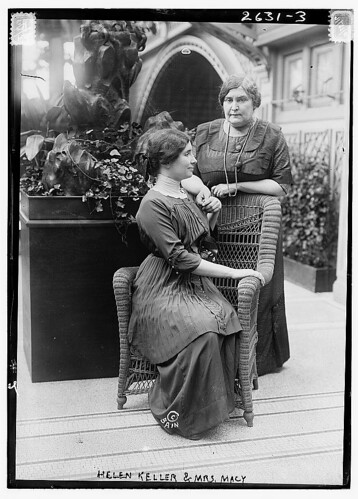Okay, I'm here for BADD 2015, because how could I break our ten-year streak of participation? I couldn't. I'm not so much of a blogger these days, but I'm willing to add my bit to the big event. For our past nine appearances in the series:
2014, 2013, 2012, 2011, 2010, 2009, 2008, 2007, 2006. (For the record, the 2007 and 2008 entries are two of my favorite blog posts I've ever written, on any blog, or any topic. BADD has been good for me.)
Last year I wrote about why Wikipedia needs more and better content on disability topics, and how anyone can help; and how that fights disablism, by shifting language, removing cliches, decreasing melodrama, respecting personhood, perhaps in small ways, but for a big diverse audience that will never see your blog or your journal article. I'm still pretty involved there, and in the past year I've found more ways to discover stories to improve Wikipedia's disability content; so I'm still preaching that same sermon today.
But first:
 |
| Headline from a 1910 Aberdeen Herald newspaper, from Aberdeen, Washington, reads "Ableism the Issue; All Others Sunk into Insignificance in this County; All kinds of Diversions are Attempted by the Abel Press, but are not Successful. What is Abel Spending So Much Money For?" From Newspapers.com |
 |
| Eliza Suggs (1876-1908), temperance activist |
One of the ways I'm using searchable old newspapers like this is to find the disability stories that are hiding, that are lost, that we forgot, that we need to remember. Not all of them made the big national papers, but they survive in local dailies, and sometimes there's plenty to meet Wikipedia's criteria for notability and reliable sources, and start a new entry. Maybe everyone knows about Helen Keller, or thinks they do, enough to put her on US currency (again). But there are so many others worth learning about! Some American biographical examples, from recent wanderings on Wikipedia or in old US newspapers:
1. Eliza Suggs (1876-1908): "Carried in arms or wheeled about in a carriage, her frail hands and well developed head have accomplished wonders, obtaining a fair education, which makes her a valuable assistant, sometimes as secretary of religious organizations and work. In former years she assisted her father, more or less, in evangelistic work, and she has presided in public meetings with marked dignity and ability." Suggs was born in Illinois, to parents who met while they were enslaved on a Mississippi plantation; she had osteogenesis imperfecta (OI), and was a temperance activist alongside her preacher father, and later on her own. I didn't write this entry but I'm glad somebody did. Here's her memoir online, along with a photo of Miss Suggs (above, right).
2. Anita Lee Blair (1916-2010) was the first blind woman to serve in any US state legislature. I wrote about her on DSTU a few years ago, and finally got her Wikipedia entry started earlier this year. I found a campaign ad of hers from 1952 in a Texas newspaper recently, too, featuring her guide dog Fawn, and text proclaiming her achievements and her independence.
 | ||
| "Fear" (1981) by Elizabeth Layton; a drawing of an older woman peeking out from a closet with a fearful expression |
3. Elizabeth Layton (1909-1993) was an artist based in Kansas who found her art late in life, in a drawing class she took at age 68, hoping it would help with her lifelong struggles with depression, and with more acute grief following the death of her son. It did help, and it also brought her national acclaim: in 1992 she was the focus of a show at the Smithsonian's National Museum of American Art. I started her Wikipedia entry last week. At left, a 1981 drawing by Elizabeth Layton, titled "Fear." (Were you expecting sentimental art from an old lady? Her drawings were edgy, even controversial.)
4. Dwight D. Guilfoil Jr. (1926-1989) was a businessman and a disabled veteran, who advocated for hiring disabled workers, and used his own company to demonstrate the possibilities. Guilfoil doesn't have a Wikipedia entry yet, but I think he'd be a great candidate for one. For now, check out an essay he wrote titled "Let's Stop 'Handicapping' Americans," which appeared in syndication, in newspapers across the US, in 1960.
UPDATE (February 2016): Dwight D. Guilfoil Jr. has a wikipedia entry now.
5. Mary Dobkin (1902-1987) was a immigrant child in Baltimore when she lost both feet to frostbite as a little girl. This early experience, and a lifelong love of baseball, made her a tireless advocate for poor kids in her adopted city; she coached kids' teams, integrated during the Jim Crow era, and took particular interest in providing sports opportunities for disabled kids. There was a television movie made about her in 1979, but until today, no Wikipedia entry. So I'll get right on that.
By the end of today, California time, there will be a new Wikipedia entry on Mary Dobkin, in honor of BADD 2015. (I'll light up her name as a link when the entry is up.) Anyone want to join in? Plenty of other stories to tell, and every well-told story helps.







